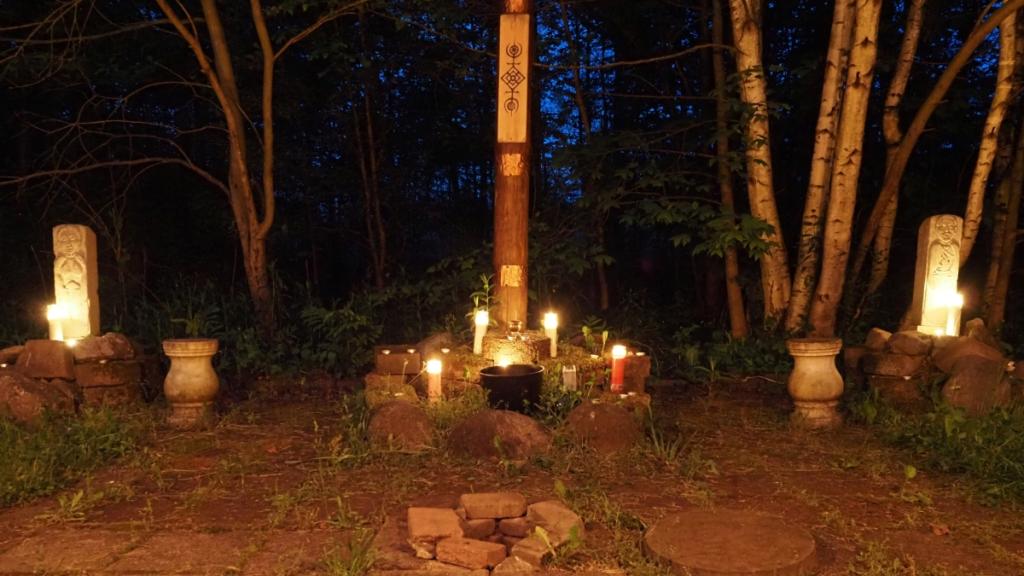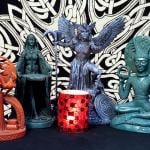As a Druid who is a member of ADF (Ár nDraíocht Féin) I am happy to spread the word that we have a new Archdruid: Rev. Jan Avende, who was elected by popular vote and began their service on May 1. I’ve gotten to know Jan at several ADF events over the years and I’m very happy about this.
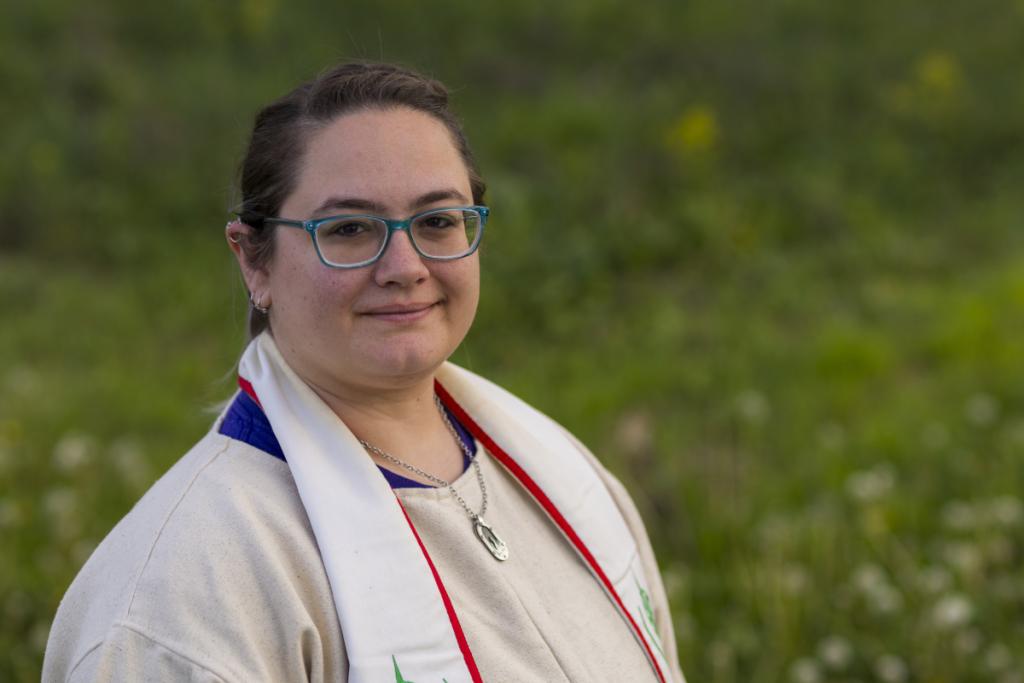
From the ADF press release
With nearly a decade of priestly service under their belt, and nearly two decades of involvement with ADF, Rev. Avende has a depth of work to bring to the table. They have served several positions within ADF, including Vice Archdruid, Initiate Program Preceptor, Regional Druid for the Heartland Region of ADF, Chief of the Bardic Guild, and many other roles serving our international membership.
Adding to their resume include two years of work as a prison chaplain, a year as a hospital chaplain at OhioHealth’s Grant Medical Center (Level 1 Trauma Center), and they are nearing completion of work for eligibility to become a board-certified chaplain. On the local level, Rev. Avende has also been a Grove Priest of Three Cranes Grove, ADF, in Columbus, Ohio, for nine years, managing much of the day-to-day liturgical and spiritual needs of their local community, both in the Grove and beyond.
Their M.A. in Education has also served them well on this journey, leading to the publication of three books on ADF Druidry: The Spiraling Sun, a Winter Solstice Liturgy; Kindling Sparks: A Religious Education Program for Young Pagans; and co-authoring ADF’s free-to-the-public training program, The Hearth Keeper’s Way.
Rev. Avende is also the first person to serve as ADF Archdruid who is not a cisgender man; when asked about this, they stated, “We all know the face of modern Paganism is changing; I hope that I can be part of showing that modern Druidry is open, welcoming, and inclusive. We have a long way to go, but every new face, every different person, every connection is meaningful, especially to those who haven’t experienced that connection before.”
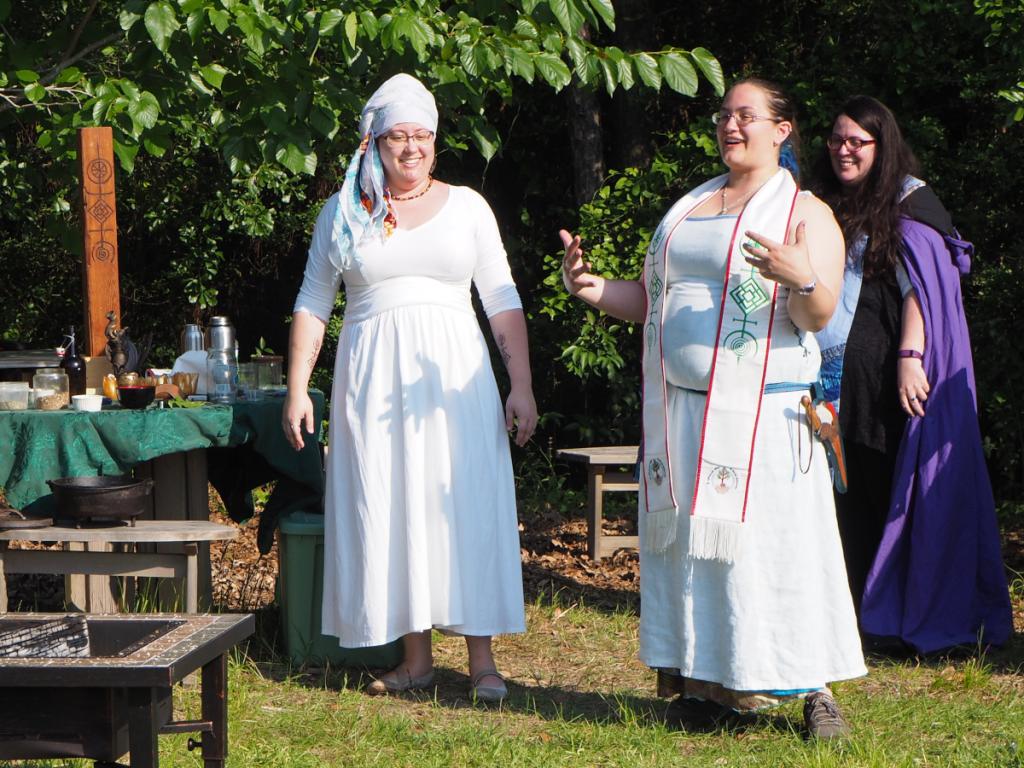
My interview with Rev. Avende
What brought you to ADF in the first place?
I actually found out about ADF before I started college at The Ohio State University, and was looking for Pagans to meet in person once I moved away from home. This was in the early internet days, and I ran across the LiveJournal community for ADF dedicants. I ended up chatting with ADF members there, and finding out that several of them belonged to The Ohio State University’s Pagan Student Association, including Rev. Michael J Dangler (an ADF Priest and founding member of Three Cranes Grove, ADF, the ADF grove in Central Ohio). I joined and eventually ending up leading the Pagan Student association through the end of my undergrad, and it was a really formative experience for me. I met lots of different flavors of Pagans that way, and really expanded my worldview of what kinds of spirituality exist under our umbrella.
My own path began from a Hellenic Recon perspective, but throughout my time with the Pagan Student Association, and getting to know the Three Cranes Grove community, I settled in and found that ADF-style Druidry really dovetailed with my personal beliefs, values, and practice. Even more than that though, I found community with the Cranes, and can’t imagine life without them now.
What inspired you to pursue leadership roles within ADF?
I already had experience in leadership outside of ADF, and so when I joined, my grove encouraged me to get involved with small positions first, as well as taking on leadership roles within the grove. I served as the Chief of the ADF Bardic Guild for awhile, and as the Secretary for Three Cranes Grove. A little later, when I began serving as the Heartland Regional Druid, was when I really felt myself called to do more for the organization. Being a Regional Druid allows you to travel and meet people beyond just your local community. It wasn’t long after serving as a Regional Druid that I pursued Initiation and Ordination in ADF, because I realized this was well and truly my home, and I wanted to be a part of serving these people.
Leadership has always been about people and reciprocal relationships for me, and with hospitality and ghosti (reciprocity) being so integral to ADF’s practice of religion, it makes sense to me why I’m drawn to serve as a leader here. I want to be in the places where I can help people feel like they’re part of something bigger than themselves. In some cases we experience that as “the divine” or “the sacred”, but in other ways it’s also what unites a community. Paraphrased from what I wrote in the ADF Hearth Keepers Way manual: “When we join this community of ADF, we become one of the many flames that feed its hearth fire. That fire within each of us becomes a star, lighting up the night sky we share. With our fires burning strong together, we each burn brighter in our practice and our faith.”
Which I hope not only answers the question of “why leadership?” but also the question of “why ADF leadership?” This is my home. These are my people. And I want to do all I can to grow and tend and care for this community.
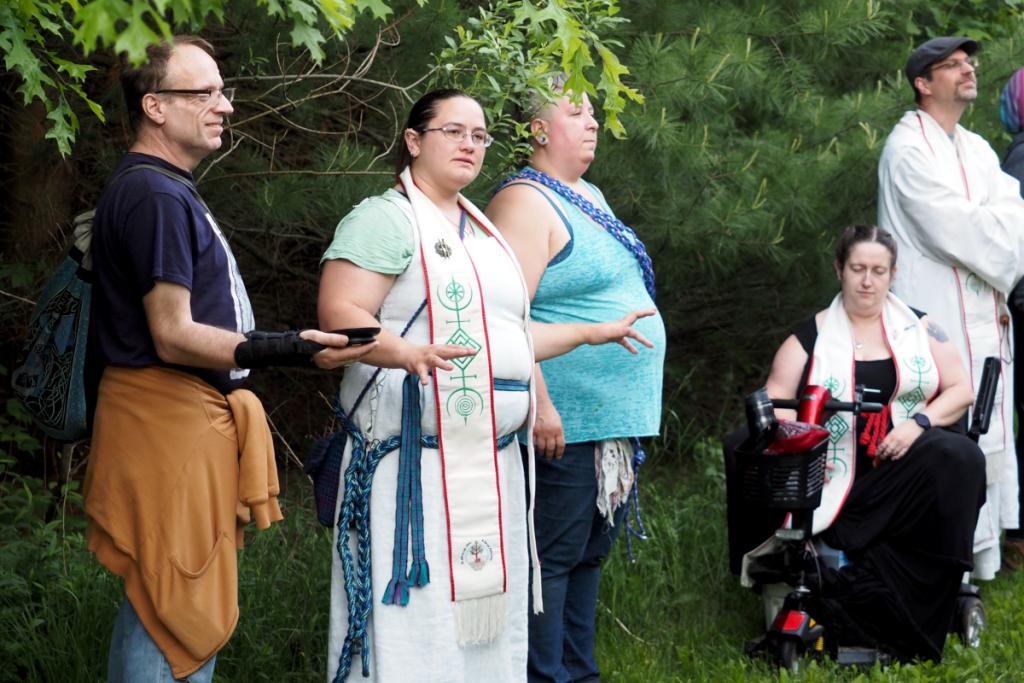
One of your primary goals is to help ADF’s membership feel more connected to the organization. Can you talk about one or two things you think will move us in that direction?
#1 – Get the new website off the ground and released. I know, I know, we’ve been trying to hype up this whole “new website” thing for almost as long as I’ve been part of ADF, and I’ve seen its progress through many iterations, so I totally get the skepticism, but I’ve now also seen and explored around the beta site and it is freaking amazing!
It will be our own self-contained social media and learning management system all rolled into one, without having to worry about our data or our money going to anyone except ADF. Having a place like this that feels modern and private, and already uses an interface that many people are comfortable with, I think will help us by leaps and bounds to deepen our connections to each other and to the organization as a whole.
We’re a diverse group, spread across time zones and continents. If we can connect with videos and pictures and status updates all internally, in addition to our regular email list communications, I think that can only help bring us together.
#2 – A culture of trust. All organizations have turbulence, and they all have to go through very common phases of development (I am heavily informed by Tuckman’s model). In the grand scheme of things, we’re still a young religious movement, meaning that though we may have worked through the Forming stage, and weathered a lot of the Storming stage, we still have little pop-up storms as we work into the Norming stage.
This is not a “one-person” problem, and it can’t be a “one-person” solution. Acknowledging this process without judgement, and as a normal progression of groups, will allow us to solidify our Norming stage, and move into Performing, where leaders are actively involved and the group is focusing on common goals.
We need to build rapport and trust with each other to make that happen. All that being said, my skill set, values, and philosophy lead me to want to help our members feel motivated, trusted, and involved in the group they’re a part of. Through our own surveys sent to members, we’ve found that most people join because they want to be part of a group of like-minded people learning to do similar things. I plan to explicitly encourage that by creating bite-sized, low-stakes volunteer roles that allows each member the opportunity to share their unique knowledge and talents and be a living part of what makes us a community.
What other goals do you have for your time in office?
The other goals I have are more to do with administrative streamlining.
Ian Corrigan likes to say that ADF started a religious hobbyists club, but out of that we’ve really grown into a fully functioning non-profit religious organization. Some of our processes still reflect the club mentality (and no shade, that’s where we started, and it’s true to our roots. But to become a thriving tree, we need to tend the growth we’ve had since we were a small sapling), and I’d like to see us really examine non-profit best practices, especially as they relate to religious governance.
I’m not exactly sure what this will look like yet, but I think it’s time we start having those conversations and doing that research. Again, we have a lot of talents and knowledgeable people in our organization who can help with this process, and we owe it to our predecessors, ourselves, and our descendants to make sure ADF thrives.
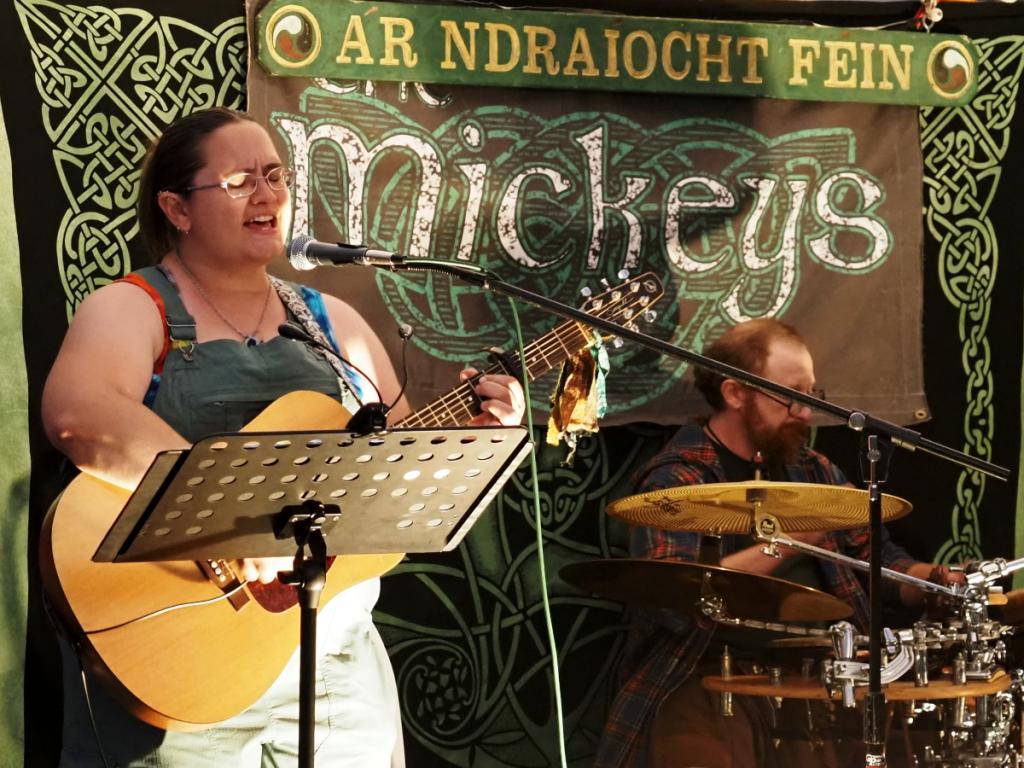
Survey after survey shows that Christianity continues to decline in the United States. But most people who are leaving aren’t converting to another religion. Instead, they’re becoming “spiritual but not religious” or “none of the above” – maintaining some high-level beliefs and practices but not actively participating in any religious group. How can ADF best respond to this trend?
ADF has long walked the line between “this is our firm identity” and “your practice can fit here too,” which I still think is a good place to be: we should be inclusive of people’s identities and practices, but also be able to say “this is what makes us ADF.” Part of this is shifting the language we use when speaking. We need to talk about what we are, rather than what we aren’t. I don’t want people to get the impression that we’re at odds with other faith traditions, especially other traditions also fall under the Pagan and polytheist umbrella. Now more than ever our communities need solidarity, and to understand that we don’t have to practice and believe exactly the same way in order for us to work together to ensure our safety and continued existence as a movement.
I think the best way to approach this is through each person (but especially our more visible and public members) authentically doing whatever their practices are in a way that others can see, follow, and resonate with.
I’ve done this myself with the #PrayerADay Project. As a former English teacher, I firmly subscribe to the idea of “show me, don’t tell me.” People will seek meaning as they are called to, and if they see us in ADF doing things that bring us meaning, they may want to give it a try. And if they do, we can be ready to welcome and teach them, and help them find the meaning they seek, even if we’re only a stop on their spiritual journey.
And also, what can ADF do to demonstrate that there is still value in being part of a local religious community?
I think your local religious community can be your village. They’re not just who you celebrate huge rites of passage and milestones with, but they’re also who you have consistent interactions with: who you share weekly or monthly dinners with, whose mail you check when someone goes on vacation. Your religious community is something that if you support it with the gift of your presence, it will support you in turn when you’re in need.
ADF is a religion with reciprocity as a core value. We are all, always, in relationship with each other and the world around us. Our local community can help keep us rooted in that place, even as our pocket friends and far-flung communities help keep us flexible to meet the changing times. I think there is definite value in a local community (and I’m not just saying that as an extrovert), but it’s a both/and kind of situation.
My local community feeds my soul in a very different way than my online community does, and I need both of them to thrive. ADF with its in-person groves, hybrid groves, and virtual groves helps to feed us on all those levels.
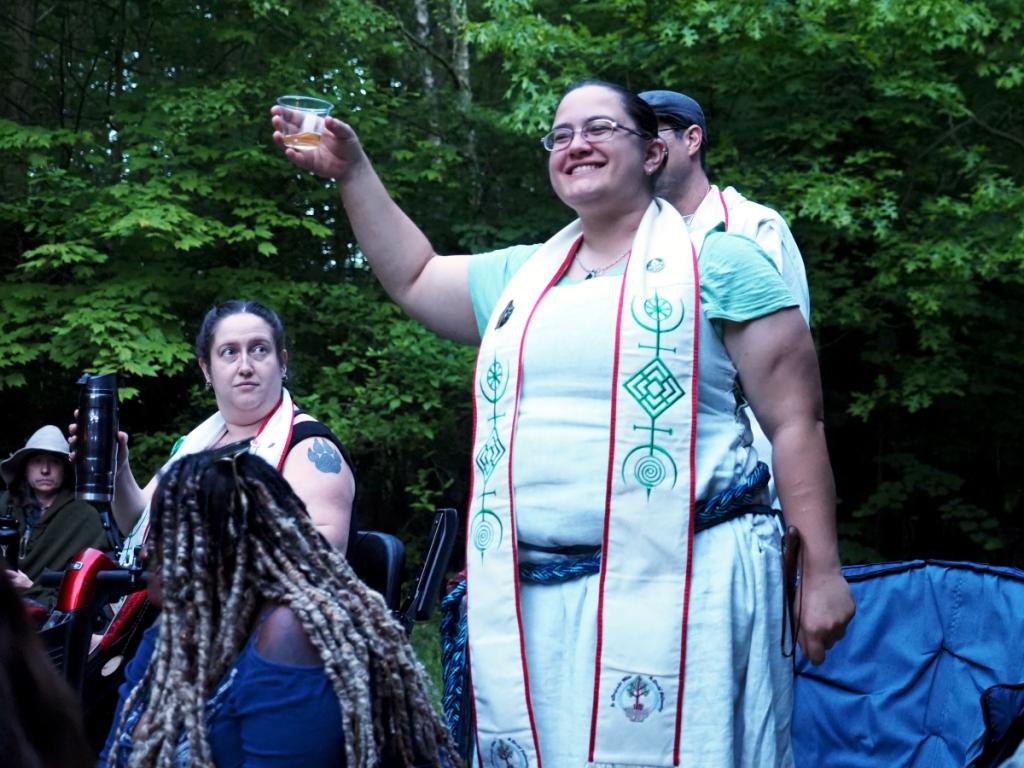
You are the first Archdruid not directly connected to the founding of ADF over 40 years ago. How does this perspective help you plan for the future of the organization?
It really resonates with one of our common liturgical phrases: “As our ancestors did before, so we do now, so our descendants may do in the future.” I think being in the middle section, “doing now,” really helps give me the perspective that this can and will outlive me, but that I have work to do to make it so.
I may be a convert, as many Pagans still are, but I’m raising my children in this religion. I’m creating and publishing Pagan religious education materials for families. I’m trailblazing to become a board certified chaplain that will actually be endorsed by a Pagan organization. My goal, my vision, is to make the path for others as clear and smooth as I can. I hope to never raise barriers behind me, but only work to break them down in front of me.
When you found something, it’s hard to know if it will survive, and truly the best indicator of that continued existence is when it moves beyond you. I am that indicator for ADF, and that gives me great joy and hope, but also great responsibility and obligation that this progress doesn’t stagnate with me. With every step I take, and each point of change and progress, I’m documenting and planning so that when I eventually hand off to the Archdruid who comes after me, they’ll be ready to help us fly.
Finally, what’s your big, long-term dream for ADF? When you look forward not just to the end of your time as Archdruid but to the time when your generation of leaders has completely passed the sickle to the next generation (and the generation after that) what do you see?
I see us as a thriving community that knows we can operate with our ethos of shared practice and values binding us together. I see us as a place where Pagans of all paths can come to get training that is recognized by governments and professional organizations. I see us working on an interfaith level with other large Pagan and polytheistic organizations. I see us growing in numbers so that you won’t have to worry about being without local community where you live, because there will be a grove wherever you are.
If you want your kids to be given a foundation in values and encouragement to use those values to discover their own beliefs, you’ll find it in ADF. If you want the training to become a military faith group leader, or chaplain, or professor of religion, or counselor, you’ll find it in ADF. If you want a to find a grove in any new city you move to, you’ll find it in ADF. If you find yourself marginalized, and you need a warm-hearted and inclusive community to stand up for your human rights and dignity, you’ll find it in ADF.


